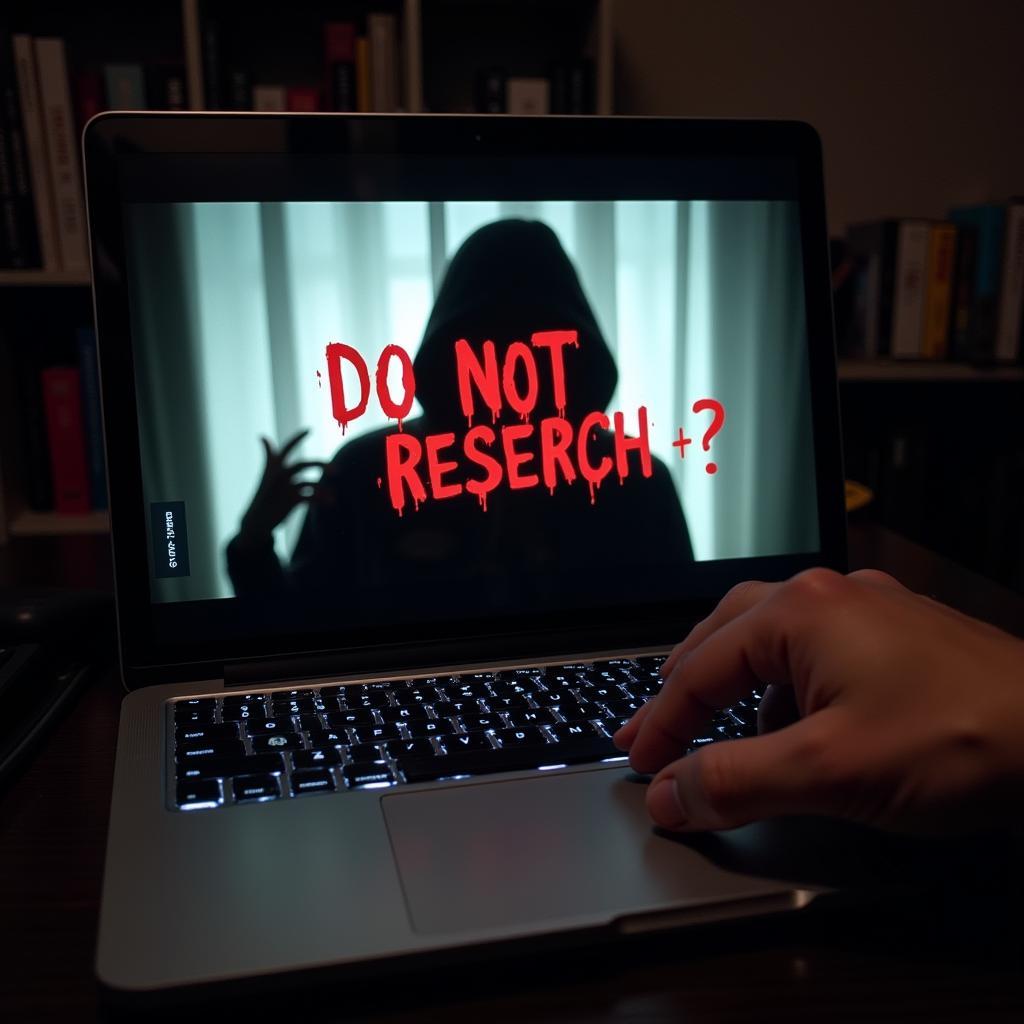The internet is awash with mysteries, but few phrases pique curiosity quite like “Do Not Research.” It’s a siren song, tempting us to delve into the unknown despite (or perhaps because of) the implied warning. This article explores the phenomenon of “do not research,” examining its psychological impact, potential dangers, and the reasons why we’re so drawn to the forbidden.
Why the Intrigue?
The human psyche is wired for curiosity. We’re naturally drawn to the unknown, driven by a primal need to understand the world around us. The very act of being told “do not research” triggers something called reactance—a psychological phenomenon where we’re more likely to engage in a prohibited behavior simply because it’s forbidden. This inherent rebelliousness, combined with our thirst for knowledge, creates a potent cocktail of intrigue.
 Forbidden Knowledge
Forbidden Knowledge
The Psychology of Curiosity and Fear
“Do not research” taps into our deepest fears and desires. On one hand, there’s the thrill of the unknown, the excitement of potentially uncovering something extraordinary. On the other hand, the warning itself implies danger, hinting at consequences we can’t fully comprehend. This interplay of curiosity and fear creates a powerful emotional hook that keeps us glued to the screen, eager to unravel the mystery.
Urban Legends and the Digital Age
The internet has become a breeding ground for urban legends and creepypastas, many of which utilize the “do not research” trope to great effect. These stories often involve cursed websites, haunted videos, or mysterious disappearances, preying on our innate fears and anxieties. By forbidding research, they create an aura of mystique and danger, ensuring that the story spreads like wildfire through online communities.
 Digital Urban Legend
Digital Urban Legend
The Importance of Critical Thinking
While the “do not research” phenomenon can be intriguing, it’s crucial to approach such claims with a healthy dose of skepticism. Not everything we read online is true, and it’s important to distinguish between harmless entertainment and potentially harmful misinformation.
Dr. Emily Carter, a researcher specializing in online behavior, emphasizes this point: “It’s natural to be curious, but we must engage our critical thinking skills. Is the source credible? Is there evidence to support the claim? These questions are vital when navigating the often-murky waters of the internet.”
When Curiosity Can Be Harmful
In some cases, the information we uncover through research can be disturbing, upsetting, or even dangerous. This is especially true when dealing with sensitive topics like true crime, conspiracy theories, or the occult.
research indicates students talk more than teachers in typical classrooms. This kind of research can trigger anxiety, insomnia, or even contribute to more serious mental health concerns.
The Power and Responsibility of Information
In the digital age, information is readily available at our fingertips. However, this ease of access comes with a responsibility to be discerning consumers of information. We must be mindful of the potential consequences of our research, both for ourselves and others.
Conclusion
The allure of “do not research” lies in its ability to tap into our primal instincts of curiosity and fear. However, it’s crucial to approach such claims with a critical eye, separating fact from fiction and recognizing the potential dangers of unchecked curiosity. While the internet can be a valuable tool for exploration, it’s important to remember that not all knowledge is meant to be found.
FAQs
1. Is “do not research” always a red flag?
Not necessarily. It’s often used as a narrative device in fiction or as a marketing ploy to generate buzz. However, it’s always best to err on the side of caution and evaluate the source and context of the information.
2. Can researching disturbing content be harmful?
Yes, exposure to disturbing content can have negative psychological effects, especially on individuals with pre-existing mental health conditions. It’s important to set boundaries and prioritize your well-being.
3. How can I protect myself from misinformation online?
Verify information from multiple sources, be wary of sensationalized headlines, and be critical of information that confirms your existing biases.
4. What should I do if I encounter disturbing content online?
Report it to the platform where you found it and seek support from a trusted friend, family member, or mental health professional if needed.
5. Is it ever okay to ignore a “do not research” warning?
Use your best judgment. If the source seems credible and the topic is of genuine interest, proceed with caution and be prepared for the potential consequences.
Do you have any other questions or concerns related to “do not research” or other paranormal phenomena?
For further assistance, please contact us:
Phone Number: 0904826292
Email: research@gmail.com
Address: No. 31, Alley 142/7, P. Phú Viên, Bồ Đề, Long Biên, Hà Nội, Việt Nam
Our dedicated team is available 24/7 to provide support and guidance.
We also encourage you to explore our other articles on best etsy keyword research tool and qualitative research and bias for further insights.